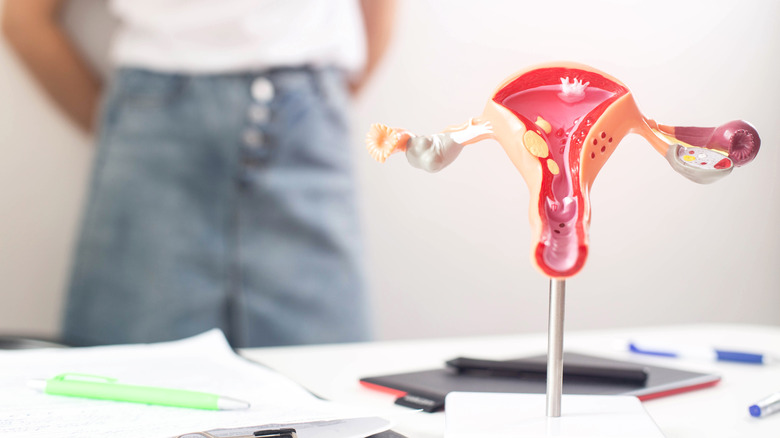What It Really Means When You Don't Have Cramps On Your Period
How many times have you had a feeling, almost like it was a sixth sense, that your period was right around the corner while you were just going about your day? Or maybe a sudden onset of cramps gave it away that your time of the month was soon approaching. According to the Mayo Clinic, menstrual cramps can begin from one to three days before the start of a period.
Cramps, also referred to in the medical world as "dysmenorrhea," can either be mild or severe and normally become less painful with age, says WebMD. Menstrual cramps may be at their most intense 24 hours after a period starts, and will usually subside within a few days.
The reason why cramps can begin before a period starts is because of hormonal changes that are occurring inside the body, leading to the contraction of the uterus and the breaking down of the uterine lining, explains Norton Healthcare. Prostaglandin is the hormone-like compound responsible for contractions of the uterus, and higher levels of it can contribute to painful periods, per the Mayo Clinic.
Although OB-GYN Associates reports that at least 80% of women report having experienced menstrual cramps during their period, some women don't have them. We may look at these women and think to ourselves about how lucky they must be to not experience such pain — but is not having period cramps good for your menstrual health, or could it be a sign that something is amiss?
Why you shouldn't worry if you don't get period cramps
Although it might initially be alarming to notice that you aren't experiencing period cramps when you hear that other women are, it could be helpful to remind yourself that every woman experiences their menstrual cycle differently. Dr. Madhuri Burande Laha tells HealthShots that not having cramps during your period is completely normal, and is likely nothing to be worried about. Another gynecologist, Dr. Kathryn R. Bradley, shares with Norton Healthcare that some women don't have menstrual cramps or discomfort during their period.
On the contrary, it can actually be more worrisome when someone is having severe menstrual cramps, as they could be an indication that something isn't quite right. Some health conditions such as polycystic ovary syndrome (PCOS), endometriosis, and uterine fibroids can contribute to painful menstrual cramps (per HealthShots). The Mayo Clinic reports that endometriosis, for example, is associated with period pain because of tissue that grows on the outside of the uterus. If your period pain is so severe that it interferes with your daily life every month, or symptoms continue to get worse, it's important to speak with your doctor.
Generally, if you are someone who isn't experiencing menstrual cramps during your period, there shouldn't be a cause for concern — however, you could always speak with your gynecologist about your worries if you would like to have some additional reassurance.


